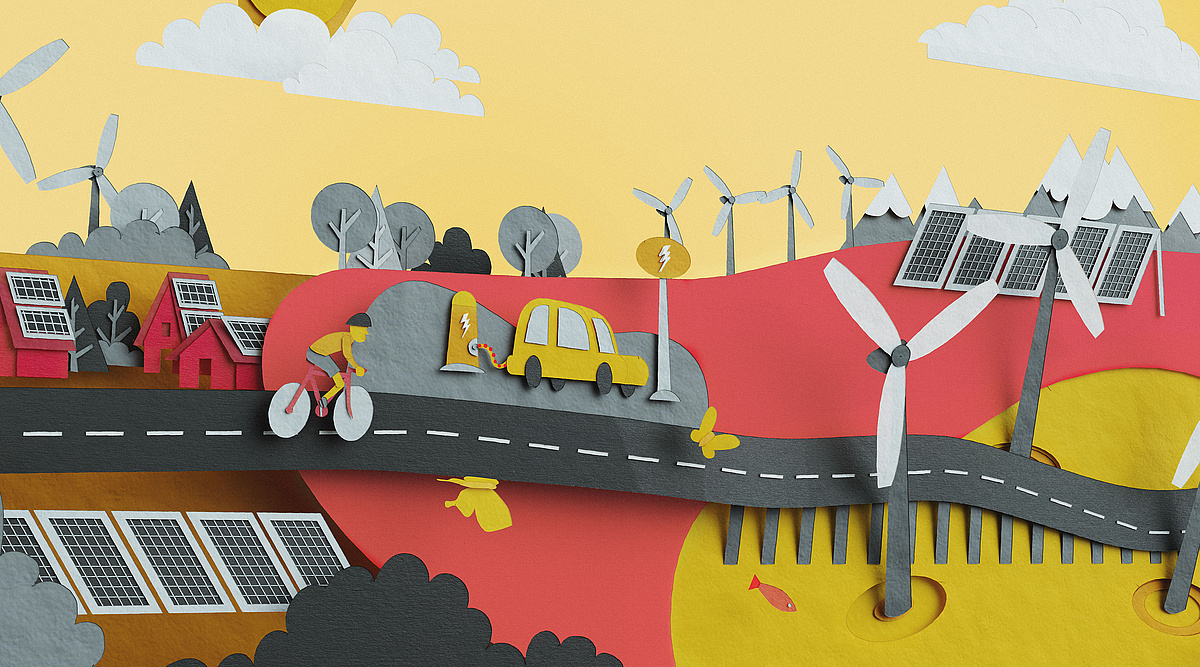Decarbonisation:
a Win-Win for the Economy and Ecology
Germany’s ambitious commitment to decarbonisation is aimed at coupling ecological preservation with economic growth. Discover how the country’s green energy transition is creating a better environment for both the natural world and business, and how international investors and companies can benefit.
Green Light for a Greener Future
The task of decarbonising the economy, already a priority at the start of the 2020s, has only grown in urgency over the last year. While tackling climate change remains the primary motivation, the drastic increase in fossil fuel prices coupled with the profound threat posed to European and in particular German energy supplies by the fallout from Russia’s invasion of Ukraine have provided additional impetus. Few sectors will remain untouched by the transition, but key areas include the hydrogen economy, a massive increase in the use of renewable energies, electrification of heat and mobility, energy efficiency and circular economy principles that replace waste management with resource management, recycling, and reuse.
Decarbonisation will come at a cost, but it also promises huge benefits, both ecologically and economically. The shift away from high-emissions products and economic activities will only succeed if demand for low-emissions products and activities rises. Investors and companies that help to innovate and boost the efficiency of these key technologies and infrastructure thus have a historical opportunity to benefit from growing markets, and can count on help in the form of major funding programmes and progressive, environmentally friendly regulations. As Europe’s largest economy and a pioneer in green technologies, but also as a major producer of emissions, Germany understands the urgency and magnitude of the task ahead better than most other countries.
Greentech Growth
Germany’s greentech market is growing at about 8% annually and is set to soar in value from EUR 392 billion in 2020 to EUR 856 in 2030.
Eco-Share of GDP
20% of Germany’s GDP is expected to be 100% eco-friendly by 2025.
Environmental Necessity.
Historic Investment Opportunity.
As Europe’s biggest economy and largest source of carbon emissions, Germany is acutely aware of the challenges of decarbonisation – but also uniquely positioned to meet them. The creation of a new “super-ministry,” the Federal Ministry for Economic Affairs and Climate Action, shows just how closely the new coalition government plans to link ecology and economics going forward. By law, the country must become carbon neutral by 2045, and major funding programmes and legal regulations are creating the framework to make this ambitious goal a reality.
By law, Germany is to become climate neutral by 2045
Hydrogen and renewable energies, including solar and wind power, are a major focus. As home to Europe’s largest automotive industry, Germany is also at the forefront of the transition to electric mobility, creating major investment opportunities in technology ranging from battery recycling to charging stations. As digitalisation becomes ever more widespread, there is also demand for more energy-efficient “green IT”. The move away from plastic as well as a booming circular economy market that is predicted to grow by almost 6% annually during the current decade are other sectors of note.
Germany’s booming circular economy is predicted to grow by 6% annually
The incentives for foreign investors are numerous. Both the German government and major corporations regularly issue major tenders that are open to foreign investors. In the private sector, too, corporations are increasingly interested in international cooperation. After all, no country can tackle climate change alone, and pooling the best of resources is essential. Coupled with major R&D funding for both large corporations and SMEs, and a highly skilled, internationally-minded workforce, Germany is one of Europe’s most attractive markets for investing in decarbonisation.
Lasting commitment to sustainability
A sustainable approach to economic development is essential to ensuring lasting competitiveness in the 21st century. Germany has gotten off to a strong start in some areas: in 2021, for example, renewable energy sources produced more electricity than all fossil fuels combined, accounting for over 41% of electricity demand. Under the Climate Action Programme 2030 and the Climate Action Act (Klimaschutzgesetz), the German government has made a binding commitment to reduce greenhouse gas emissions by 55% by 2030, and by law the country must become climate neutral by 2045.
41% of electricity demand covered by renewables
In 2021, renewables already accounted for nearly half of Germany’s energy demand.
55% reduction of greenhouse gas emissions
Germany’s goal for 2030 is to reduce emissions by more than half.
Although substituting gas in the short-term, the country is phasing out the use of coal to generate electric power in the long-term, turning instead to hydrogen and renewable sources. Other key factors in the drive to lasting sustainability include the transition to electric mobility, electric heat-pumps, a move away from plastic packaging, and circular economy principles. The challenges are many, but by enshrining the task in law, Germany has shown that having started on this journey there is no turning back.
History of Pioneering Green Technologies
Germany has historically been a global leader in pioneering green technologies. From solar panel manufacturing in the early 2000s to inventions in battery technology today, it has a long tradition of bringing groundbreaking new technologies into the mainstream. It is also Europe’s largest market for sustainable wastewater management and the continent’s largest exporter of wastewater technologies.
Battery and hydrogen technology are driving current innovations, while the German circular economy industry is expected to grow by nearly 6% annually over the next decade. Strong legal frameworks supporting green innovation and major funding for sustainability research make the country a highly attractive investment location for all those involved in greentech.
Emphasis on R&D
Intensive research and development is essential to achieve decarbonisation goals. There are currently more than 120,000 research projects in environmental technologies in Germany, ranging from water and energy to biodiversity. Major German government funding programmes include the Federal Ministry of Education and Research‘s (BMBF) “Research for Sustainability” programme, worth EUR 4 billion for the years 2020 to 2025.
The BMBF’s “KMU innovative” programme, meanwhile, launched in 2007, supports SME research into topics ranging from the bioeconomy to resource efficiency and climate protection. To date, close to EUR 1.8 billion in funding has gone to more than 2,400 projects involving nearly 4,000 SMEs, many of which are successful first-time funding applicants. Coupled with numerous first-class research institutes and the R&D departments of major corporations, Germany offers a thriving R&D landscape full of opportunities for both funding and collaboration.
Massive Investments in Decarbonising the Economy
When it comes to decarbonising the economy, Germany is putting its money where its mouth is. In early 2022, the government announced an additional EUR 200 billion for industrial transformation between now and 2026 in addition to countless existing funding programmes. Key funding areas include climate protection and hydrogen technologies, and e-mobility. However, decarbonisation is an across-the-board task, which is why funding for both major corporations and SMEs already extends from the bio-economy and forestry through to the finance sector.
200 billion euros through 2026 for industrial transformation
Following German Minister for Economic Affairs and Climate Action Robert Habeck’s announcement that the country would “roughly triple” its decarbonisation efforts, this represents a historic opportunity for both German and international investors.
Germany’s Key Industries for a Carbon-neutral Future
The key to a successful energy transition
Hydrogen is increasingly seen as key to decarbonising economies and tackling climate change. Global demand for hydrogen is expected to rise from currently 76 megatonnes per year to 600 megatonnes per year by 2050 – as long as the infrastructure is in place.
Carbon neutral by 2035
Climate change, high fossil fuel prices, and the acute threat to energy supplies have made the transition to renewable energies more urgent than ever. Germany is serious about the task.
Less waste, added value
Germany is a leading environmental technologies market, accounting for 14% of global trade. Key areas include environmentally friendly energy generation, energy and resource efficiency, sustainable mobility, sustainable water management, waste management and recycling.
Driving the transition to greener, smarter mobility
Famous as the world’s automotive hub, it’s no surprise that Germany is also pioneering the transition to new mobility. From electric vehicles to automated driving, the mobility market is undergoing radical transformation and Germany is at the heart of these exciting developments.



